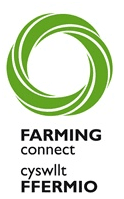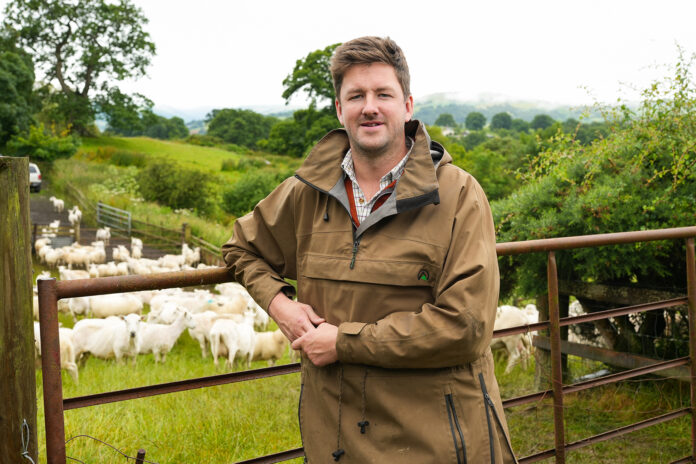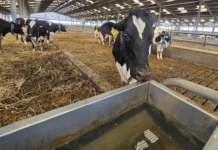 Video: https://www.youtube.com/watch?v=9aSKZFGvlvY
Video: https://www.youtube.com/watch?v=9aSKZFGvlvY
Farming Connect’s Welsh Sheep Genetics Project (WSGP) is helping to facilitate major change in a large-scale sheep flock.
The Rhug Estate near Corwen had been running a flying flock of 3,750 North of England-type mules but is now transitioning to a closed flock of Welsh ewes.
It is using performance recorded tups to produce its own crossbred replacement ewe lambs and the type of finished lambs that the business sees as key to future profitability.
Electronic identification (EID) – based technology is playing a significant role, providing data to help manage breeding decisions while allowing the farm to close its flock and breed its own replacements.
Farm manager Emyr Owen says an advice surgery with independent sheep and beef adviser Matt Blyth, arranged and funded by the WSGP, has been integral in the decision to overhaul the whole EID performance recording system.
“That meeting with Matt was a massive help, it got the conversation going,” Emyr recalls. “It has been fantastic to have that support.”
Making the switch to a Welsh ewe was in part because the breed is proven to thrive in the region in outdoor lambing systems.
Historically the lowland Rhug flock has lambed indoors from 15 March but going forward only triplet-bearing ewes will lamb indoors.
The remainder will be lambed outdoors, from the end of March to April 15, to better match the estate’s grass growth curve.
“We have an amazing shed for lambing and want to maximise live births so it is sensible to lamb triplets indoors but for the rest of the ewes it will all be done outside,” says Emyr.
Texel and Charollais tups were previously used but for the 2024 lambing season it was Abermax, Aberblack, Hampshire Down and Primera, all performance recorded.
Recorded Welsh rams were also purchased at the Prohill sale in 2023; these purchases were based on physical correctness and figures, and with consistency with the type of Welsh ewe the team at Rhug is aiming to produce.
The Welsh ewes were sourced from farms that are performance recording, with all three flocks part of the WSGP.
The Rhug flock has also joined the WSGP. “We are really thankful to be part of it, and buying the ewes from farms that are performance recording means we have gained a couple of years straight off the bat,” Emyr says.
EID is very much part of the new sheep system on the Rhug Estate.
A new weigh-head was purchased, support by a 40% grant from the Welsh Government’s Small Grants Efficiency Scheme.
“We had been using a weigh-head for the cattle for years but had nothing for sheep,” Emyr explains.
It is used in conjunction with a stick reader and integrated with Agriwebb software.
“The plan is to become a completely paperless business,” says Emyr.
Lambs are tagged at weaning and data including daily liveweight gains and slaughter weights are recorded and monitored.
The benefits of this are already being seen, says Emyr. “We have a young shepherd in charge of lambing the Welsh ewes and he has been using the stick reader to add comments about any ewes or lambs he has concerns about so that we can avoid breeding from problem animals.’
The ambition is to run the flock in three groups in an ABC system. The sheep in the A group will be those that are ‘faultless’ as they will produce the replacements for the nucleus Welsh ewe flock.
Emyr says the trait that is being most closely monitored is ewe body condition score. “BCS tells us so many things in the metric, and we can simply build protocols and key performance indicators around it.”
In the 2024 lambing season the scanning percentage in the indoor lambing ewes averaged 185% and 160% in the outdoor lambing flock. For the Welsh ewes it was 135% but, as two thirds of these were yearlings, the goal is to increase this to 150%.
Five hundred pure bred Welsh ewe lambs will be retained this year as replacements while a big proportion of the fat lambs will be processed on-farm and sold through the Rhug Estate farm shop. The remainder will be marketed through Pilgrims, ABP or Ruthin livestock market.
Although the journey to improving flock genetics and profitability is in its early stages Emyr says his confidence in the targeted outcomes is embolden by the support received through Farming Connect and the WSGP.
“One hour workshops are such a good idea from Farming Connect, for most people an hour is all that is needed but there is more support available from other parts of the Farming Connect programme if required.”

| [donate]
| Help keep news FREE for our readersSupporting your local community newspaper/online news outlet is crucial now more than ever. If you believe in independent journalism,then consider making a valuable contribution by making a one-time or monthly donation. We operate in rural areas where providing unbiased news can be challenging. |


















